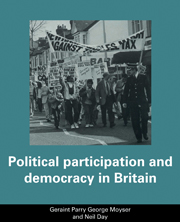Book contents
- Frontmatter
- Contents
- List of figures
- List of charts and maps
- List of tables
- Preface
- Part I Theories and methods
- Part II Patterns and pathways
- Part III Issues and actions
- 11 Agendas and political action
- 12 Do participants get what they want? The costs and benefits of participation
- 13 Learning from political participation
- Part IV The local process
- Part V Conclusions
- Appendix A Survey methods
- Appendix B Measuring elite-citizen concurrence
- Appendix C The National Questionnaire
- Endnotes
- Bibliography
- Index
11 - Agendas and political action
Published online by Cambridge University Press: 03 May 2011
- Frontmatter
- Contents
- List of figures
- List of charts and maps
- List of tables
- Preface
- Part I Theories and methods
- Part II Patterns and pathways
- Part III Issues and actions
- 11 Agendas and political action
- 12 Do participants get what they want? The costs and benefits of participation
- 13 Learning from political participation
- Part IV The local process
- Part V Conclusions
- Appendix A Survey methods
- Appendix B Measuring elite-citizen concurrence
- Appendix C The National Questionnaire
- Endnotes
- Bibliography
- Index
Summary
So far we have looked at the levels of participation and the propensity of different sections of the population to participate irrespective of the specific context in which they act. Whilst we have been concerned with the extent to which the better educated, the wealthier, or those well-integrated into group networks are inclined to participate more, we have not so far looked at the immediate cause of the actions that they have taken.
Although such an analysis of the social background of participants tends to be the classic approach to the study of participation, it clearly leaves something important out of account. People take action in response to issues, needs and problems. Usually it is prompted by some sense of dissatisfaction with their circumstances. They may be threatened with a building development which could affect the value of their property or they may have a complaint about public transport or the location of health facilities which they require to use regularly. Others may be led to act about national issues such as unemployment or international problems which might, perhaps, include a concern with famine relief or nuclear defence. In this way, people come to have a range of different priorities or ‘issue agendas’.
One way of looking at participation is, therefore, by examining the kinds of issues which give rise to action. A number of questions then present themselves which are of considerable relevance to understanding the patterns of political activity in a democracy.
- Type
- Chapter
- Information
- Political Participation and Democracy in Britain , pp. 241 - 266Publisher: Cambridge University PressPrint publication year: 1992
- 1
- Cited by



